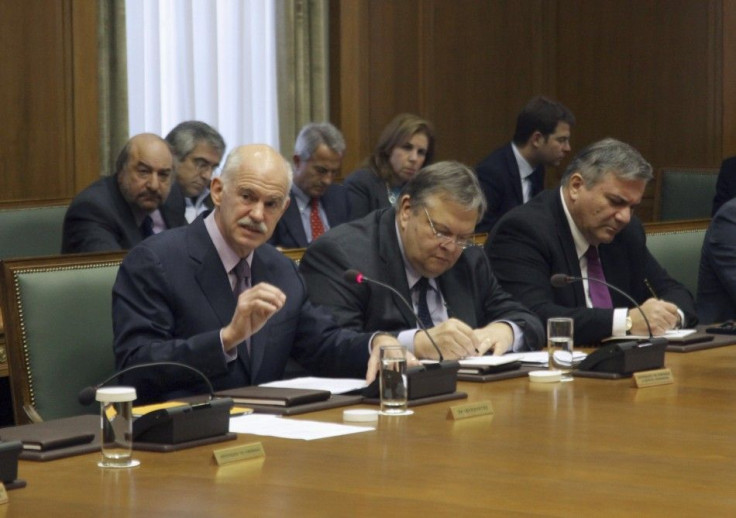Greeks to Form Coalition Government Wednesday: Official

The composition of Greece’s new coalition government will be revealed late on Wednesday, according to European media reports, citing an Athens official.
If all goes well, we will have a new government, with a vote of confidence, within the week, government spokesman Ilias Mossialos reportedly said.
Negotiations between outgoing Prime Minister George Papandreou and opposition leaders, notably Antonis Samaras, have dragged on into the third day, raising more concerns about the country’s commitment to enact budget reforms demanded by the Eurozone.
Papandreou, who has already agreed to resign, is believed to be deep in talks with both President Karolos Papoulias and leaders of opposition parties to hammer out some kind of compromise.
Some reports assert that Papandreou and Samaras have failed to settle on a new leader acceptable to both men. In addition, Samaras has reportedly rebuffed a request by Eurozone officials to submit a written guarantee that the next Greek government will abide by the European Union’s (EU) strict fiscal targets and austerity measures.
Eurozone chief Jean-Claude Juncker has even warned that if such a letter is not forthcoming, the next tranche of money from the prior bailout – 8 billion euros ($11 billion) – will be withheld. Without that cash, Greece would likely run out of money in a few weeks.
Mark Lowen, a BBC correspondent in Athens, wrote:
“A deal was close. Then it was off. Now it is unclear where we stand. The wrangling here is paralyzing the country. Sinking without a captain, reads one headline today. Why the delay? One sticking point is the reluctance of the opposition leader, Antonis Samaras, to accept an EU demand to sign a document committing his party to the latest vital bailout package. He says he will back it, but seems to be held back by some of his MPs who oppose the austerity demanded in return for the deal.”
Lucas Papademos, a former senior official at the European Central Bank (ECB), was thought to be a top candidate to be the head of the new coalition government, but now there are reports his stock has dropped.
The Papademos candidacy has hit problems that have to do with both parties, one sources told Reuters.
Lowen commented: “Lucas Papademos, previously considered the front-runner, is said to want more control over naming ministers. He apparently feels that the 100-day period envisaged for this government is too short. So new names are being touted and Greece watches and waits. Without political stability here, there can be no resolution of the debt crisis. Greeks are losing patience.”
European and Greek media have speculated on a number of possible candidates to lead the next government, including Nikiforos Diamandouros, Greece's European ombudsman; Panagiotis Roumeliotis, Greece's representative to the International Monetary Fund (IMF); Ioannis Koukiadis, a law professor and former labor minister under Papandreou’s Socialist Pasok party.
Once a coalition government is finally selected, they will rule the country for about fifteen weeks, during which time they would be expected to ratify the latest bailout from the Eurozone. Thereafter, elections would likely be called.
© Copyright IBTimes 2025. All rights reserved.





















